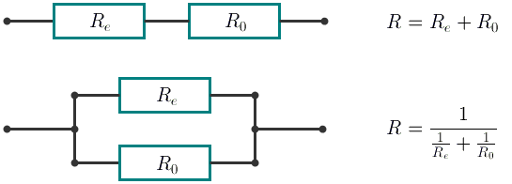Mad scientist Mike is building a time machine in his spare time. To finish the work, he needs a resistor with a certain resistance value.
However, all Mike has is lots of identical resistors with unit resistance R0 = 1. Elements with other resistance can be constructed from these resistors. In this problem, we will consider the following as elements:
- one resistor;
- an element and one resistor plugged in sequence;
- an element and one resistor plugged in parallel.

With the consecutive connection the resistance of the new element equals R = Re + R0. With the parallel connection the resistance of the new element equals  . In this case Re equals the resistance of the element being connected.
. In this case Re equals the resistance of the element being connected.
Mike needs to assemble an element with a resistance equal to the fraction  . Determine the smallest possible number of resistors he needs to make such an element.
. Determine the smallest possible number of resistors he needs to make such an element.
The single input line contains two space-separated integers a and b (1 ≤ a, b ≤ 10^18). It is guaranteed that the fraction  is irreducible. It is guaranteed that a solution always exists.
is irreducible. It is guaranteed that a solution always exists.
Print a single number — the answer to the problem.
Please do not use the %lld specifier to read or write 64-bit integers in С++. It is recommended to use the cin, cout streams or the%I64d specifier.
1 1
1
3 2
3
199 200
200
In the first sample, one resistor is enough.
In the second sample one can connect the resistors in parallel, take the resulting element and connect it to a third resistor consecutively. Then, we get an element with resistance  . We cannot make this element using two resistors.
. We cannot make this element using two resistors.
题意:给出a,b,问最少用多少阻值为1的电阻通过串并联的方式得到阻值为a/b的电阻,a/b是最简形式
分析:如果a==b,既然是最简,那么就只有等于1的情况
如果a>b,那么化成假分数,整数部分用阻值为1的电阻串联即可,剩下就得到a'<b
如果a<b,有个结论,引用一下:如果最少用K个电阻构成a/b Ω电阻,那么b/a也需K个(只需改变所有的串并联关系即可)
那么分好情况就好做了,注意结果可能会超int

#pragma comment(linker, "/STACK:1024000000,1024000000") #include<cstdio> #include<string> #include<iostream> #include<cstring> #include<cmath> #include<stack> #include<queue> #include<vector> #include<map> #include<stdlib.h> #include<algorithm> #define LL __int64 using namespace std; int main() { LL a,b,ans=0; scanf("%I64d %I64d",&a,&b); if(a==b) printf("1 "); else { while(a!=b) { if(a==0) break; if(a<b) swap(a,b); ans+=a/b; a%=b; } printf("%I64d ",ans); } return 0; }
